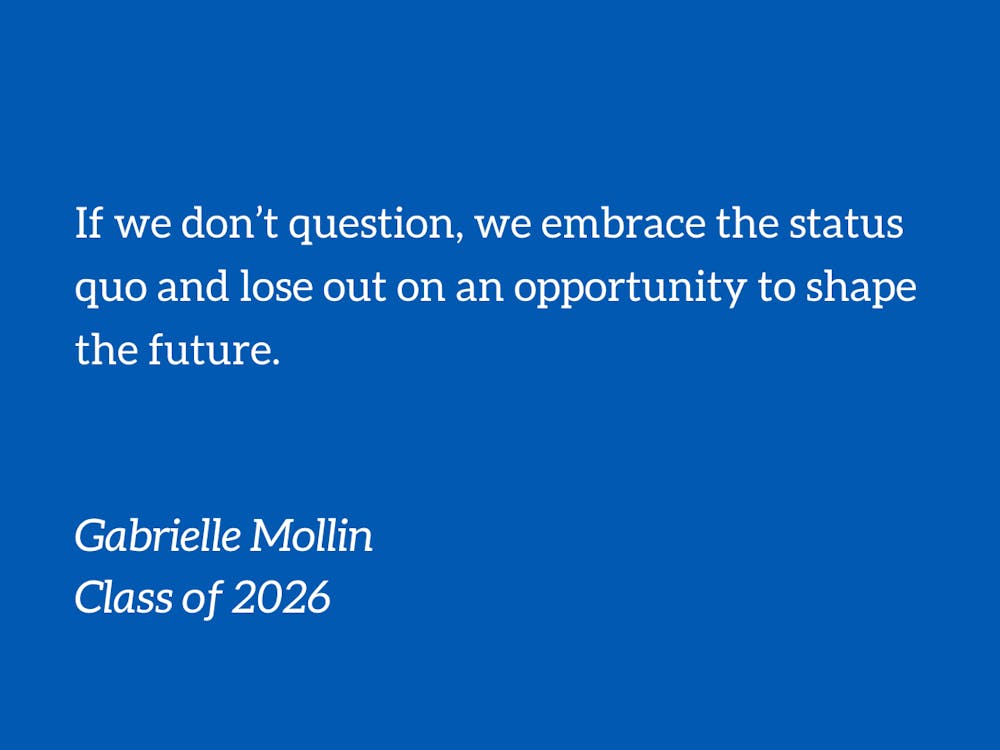One of my favorite things to handwrite is a question mark. I love the controlled squiggle of my pen coupled with the satisfaction of completing the curved symbol with a precise point, ink seeping deeply into the page. For me, the question mark is certainly the most gratifying form of punctuation.
Yet my somewhat irrational appreciation for the question mark stems from my love for questioning as a whole, not just pleasant punctuation. Curiosity and questioning are central values of the Jewish faith, and especially to the upcoming holiday of Passover, often deemed the “holiday of questioning.” As Jews across the world sit down for the Passover seder (a ritual meal for the holiday), they are encouraged to persistently ask questions throughout. And traditionally, the youngest at the table asks the “four questions” about the holiday itself. To be Jewish — on Passover and all other nights — is to readily question everything.
Consistent with Jewish culture, my parents and grandparents were insistent that my childhood be filled with curiosity and debate over dogma and conformity. I remember coming home from school days, eager to recount the highlights from my favorite history and science classes, only to have my mom question my questioning skills during the day. When I would leave for school each morning, typically rushing out the door, behind schedule with my breakfast in hand, my mom never failed to hastily remind me, “Ask good questions!”
I’ve grown up persistently asking why. And I’ve come to value good questions over answers because they’ve taught me to explore and not just discover. My proudest moments in the classroom have not been the times I’ve been able to answer questions others can’t, but instead the times I’ve posed questions that bring people to stop and think. Solutions comfort; questions disrupt. And I like to disrupt.
So as this is my last column of the semester, I’ve been reflecting on why I started this stint as an opinion writer. I’ve realized that paradoxically, my why is why. Life is pretty one-dimensional if you never stop and think about why. And being opinionated means never shying away from asking questions, even if they are disruptive. That’s what I’ve been taught to do my whole life, and that’s what I aimed to do this semester through questioning our partisan biases, the existence of safe spaces and the use of political buzzwords.
But I know life to most people isn’t so much about asking questions but finding answers, especially here at Duke. Duke students are devoted to definitives: should they take that hard class outside of their major, what grades will they get and seriously, where will they intern this summer? And while many students express disdain for the status quo, most are pretty comfortable knowing they have their answers.
Yet as tempting as it is to have all the answers, there is so much power in embracing the unknown. There is much to be said for the sheer freedom that we have as young, educated college students; how could we not use that freedom to question? We aren’t expected to have the answers at this age. And if we really are the changemakers of the future, as Duke likes to remind us, we need to be willing and ready to question everything. If we don’t question, we embrace the status quo and lose out on an opportunity to shape the future.
Rather than passively embracing traditions and beliefs because of their history, we must seek to lead questioning on the world around us. We cannot be comfortable, blindly accepting the status quo, looking for answers and avoiding tough questions. And we cannot simply believe what we read, hear and learn as objective truth. So question, ask, probe, inquire, examine, investigate and so on. Wonder why and challenge what’s around you. Herd curiosity and questions, and mold them into action, helping create a better world for everyone by persistently inquiring “Why?”
Gabrielle Mollin is a Trinity sophomore. Her column typically publishes on alternate Thursdays.
Get The Chronicle straight to your inbox
Signup for our weekly newsletter. Cancel at any time.

